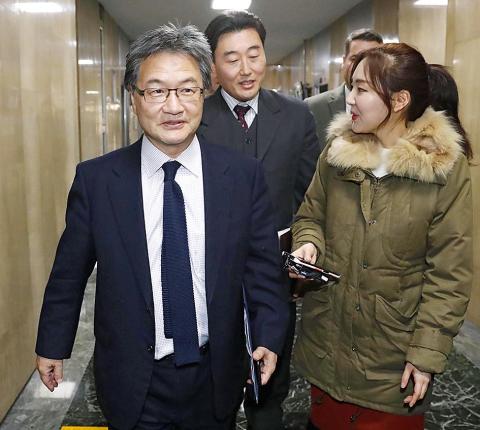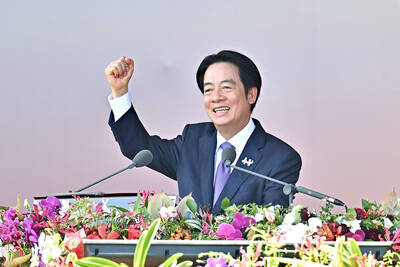US special representative for North Korea Joseph Yun is set to step down, the US Department of State said on Monday, in a move that comes as North Korean leader Kim Jong-un’s government says it is willing to hold talks with Washington.
With no ambassador in place in Seoul, Yun’s departure for “personal reasons” after more than 30 years of service leaves another hole in the US diplomatic service.
A North Korean official this week told South Korea that the door was open for dialogue, and Washington said it was willing to talk while maintaining its stance of maximum pressure.

Photo: EPA
The state department also does not have a confirmed assistant secretary for the East Asian and Pacific Affairs department.
Yun, who took up his post in 2016, advocated engagement with North Korea, even when the isolated regime launched sophisticated missiles and conducted underground nuclear tests.
During his tenure, he helped to secure the release of Otto Warmbier, a US student detained by the North, who died shortly after returning to the US. Doctors said he had obtained a “severe neurological injury” of unknown cause while in North Korean custody.
“We are sorry to see him retire, but our diplomatic efforts regarding North Korea will continue based on our maximum pressure campaign to isolate the DPRK [Democratic People’s Republic of Korea] until it agrees to begin credible talks toward a denuclearized Korean Peninsula,” department spokeswoman Heather Nauert said.
Yun’s resignation raises further questions over the North Korean policy of US President Donald Trump’s administration.
Victor Cha, Trump’s original choice to be US ambassador to South Korea, was dropped as a candidate after it was reported that he had privately expressed disagreement with the administration’s North Korea policy.
Cha, a former White House official, warned in an essay last month against hitting the Kim regime with a “bloody nose,” or targeted military strike.

The Ministry of the Interior (MOI) is to tighten rules for candidates running for public office, requiring them to declare that they do not hold a Chinese household registration or passport, and that they possess no other foreign citizenship. The requirement was set out in a draft amendment to the Enforcement Rules of the Public Officials Election and Recall Act (公職人員選舉罷免法 ) released by the ministry on Thursday. Under the proposal, candidates would need to make the declaration when submitting their registration forms, which would be published in the official election bulletin. The move follows the removal of several elected officials who were

FOUR DESIGNATED AREAS: Notices were issued for live-fire exercises in waters south and northwest of Penghu, northeast of Keelung and west of Kaohsiung, they said The military is planning three major annual exercises across the army, navy and air force this month, with the navy’s “Hai Chiang” (海強, “Sea Strong”) drills running from today through Thursday, the Ministry of National Defense said yesterday. The Hai Chiang exercise, which is to take place in waters surrounding Taiwan, would feature P-3C Orion maritime patrol aircraft and S-70C anti-submarine helicopters, the ministry said, adding that the drills aim to bolster the nation’s offshore defensive capabilities. China has intensified military and psychological pressure against Taiwan, repeatedly sending warplanes and vessels into areas near the nation’s air defense identification zone and across

SENATE RECOMMENDATION: The National Defense Authorization Act encourages the US secretary of defense to invite Taiwan’s navy to participate in the exercises in Hawaii The US Senate on Thursday last week passed the National Defense Authorization Act (NDAA) for Fiscal Year 2026, which strongly encourages the US secretary of defense to invite Taiwan’s naval forces to participate in the Rim of the Pacific (RIMPAC) exercise, as well as allocating military aid of US$1 billion for Taiwan. The bill, which authorizes appropriations for the military activities of the US Department of Defense, military construction and other purposes, passed with 77 votes in support and 20 against. While the NDAA authorizes about US$925 billion of defense spending, the Central News Agency yesterday reported that an aide of US

NATIONAL DAY: The ‘Taiwan Dome’ would form the centerpiece of new efforts to bolster air defense and be modeled after Israel’s ‘Iron Dome,’ sources said President William Lai (賴清德) yesterday pledged to strengthen the nation’s air defense capabilities and build a “T-Dome” system to create a safety net against growing military threats from China. “We will accelerate our building of the T-Dome, establish a rigorous air defense system in Taiwan with multi-layered defense, high-level detection and effective interception, and weave a safety net for Taiwan to protect the lives and property of citizens,” he said in his National Day address. In his keynote address marking the Republic of China’s (ROC) 114th anniversary, Lai said the lessons of World War II have taught nations worldwide “to ensure that